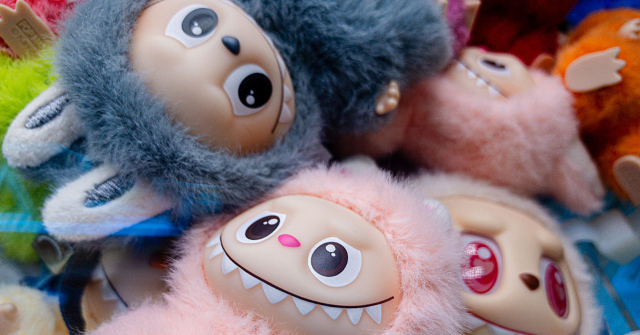A video circulating this week showed Foreign Minister Sergey Lavrov joking about the viral imp Labubu dolls during a recent visit to China, prompting China’s Global Times propaganda outlet on Tuesday to celebrate the doll as a “global sensation.”
Labubus are collectible dolls sold by the Chinese corporation Pop Mart in a “blind box” format — purchasers do not know which Labubu they will purchase before paying and opening the box, and some models of Labubu are rarer than others. The “blind box” format promotes repeat purchases from customers seeking a particular Labubu and results in sky-high resale values for the most popular or least common models of dolls.
While the dolls have been popular in China for over a year, they became a toy craze in the United States over the summer as various celebrities began sporting them on their bags. Labubu dolls have become a ubiquitous presence on the Chinese social media application Tiktok and experienced perhaps their most high-profile endorsement — prior to Lavrov’s quip — during the 2025 U.S. Open as tennis pro Naomi Osaka showed off her custom-designed Labubus after winning multiple games in the past three weeks.
Labubu also made an appearance this summer at the grave of Karl Marx, whose ideology inspired the killing of millions in China under the ruling Communist Party.
Labubus, and Pop Mart itself, have close links to the Chinese communist regime. The Chinese state news site Xinhua declared the Labubu the “new image of ‘Made-in-China’” — a successful rebrand of a manufacturing industry known for its use of slavery as a tool of genocide. Wang Ning, the founder of Pop Mart, sat for an interview in July with the People’s Daily, the official newspaper of the Communist Party of China, and encouraged creatives and businessmen to invest in the country whose economy is fully controlled by communist dictator Xi Jinping.
Lavrov entered the Labubu conversation during a visit by Russian strongman Vladimir Putin to Beijing over the past week to attend a parade commemorating the anniversary of the end of World War II along with a meeting of the Shanghai Cooperation Organization (SCO). The foreign minister appeared in a video touring Putin’s lodgings in Beijing, which the Chinese government had generously decorated with a variety of Chinese traditional dolls and Russian matryoshkas. Lavrov can be heard asking, “Where is Labubu?”
“Later, Russian Finance Minister Anton Siluanoy demonstrated what Labubu looks like on site,” the Global Times narrated as the man identified as Siluanov made an expression apparently mimicking the dolls’ grimace.
The Times, which acts as a mouthpiece for the Chinese government, celebrated Labubu’s status as a “global sensation, as the cute plush toy evokes emotion and aspiration across cultures and generations.” It also noted the astronomical growth of Pop Mart as a company largely on the back of Labubu: “The company registered year-on-year revenue growth of 165 to 170 percent in the first quarter of 2025, with overseas revenues soaring 475 to 480 percent.”
The footage serves to highlight both the warm welcome for Putin — an accused fugitive war criminal by the International Criminal Court (ICC) whose travel is limited by an outstanding warrant for his arrest — in Beijing and to celebrate the pervasiveness of Labubu as a Chinese cultural icon. Chinese state media has invested heavily in promoting Labubus and ensuring the public is aware of their relationship to China and of Pop Mart’s cozy relationship with the government. In his interview with the People’s Daily, Pop Mart founder Wang Ning repeatedly praised China for offering businesses fertile ground to thrive, undermining the reality of the Communist Party’s stranglehold on the market — which has, particularly after the Wuhan coronavirus lockdowns, devastated the Chinese economy.
“China’s inclusive culture, strong manufacturing capacity, and broad market… all provide the soil for rooting,” Wang claimed. “It is precisely Chinese manufacturing and Chinese culture that have made us what we are.”
“China’s excellent manufacturing industry and strong market can become a platform for artists around the world to incubate IPs [intellectual property], which are incubated in China and go global later,” he added.
Xinhua, in promoting the Labubu, similarly praised “China’s vast network of factories, spanning every industrial category classified by the United Nations” for its role in the popularity of the toy. Omitted from the state network’s coverage is the pervasive use of members of the Uyghur community of occupied East Turkistan, formerly imprisoned in concentration camps, as slave labor in factories throughout the country as well as on cotton and tomato farms, among other worksites.
The South China Morning Post, exploring the Labubu phenomenon in July, explicitly noted the political potential the figurine offers to help China improve a public image devastated by genocide, mass censorship, covering up the origins of a pandemic, and other actions related to its totalitarian government.
“Labubu, widely dubbed as ‘ugly-cute’ on social media, has given China a unique opportunity to soften its image at a time of deep U.S. distrust,” the Hong Kong newspaper noted, “Analysts said that limited knowledge of Labubu’s China connection among many Americans may offer advantages, allowing the doll’s popularity to expand without the negative views some Westerners have of China.”
Follow Frances Martel on Facebook and Twitter.
Read the full article here



